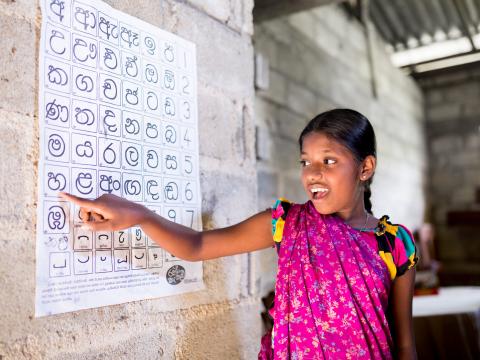Literacy for every child

Exciba, 13, didn’t know she could do well in studies. Neither did she know she would be smart enough do ever attend a ‘good’ school. But here she was, attending a National School and even coming among the top ten students within her first year itself.
Few years ago, being thirteen and at school was not common for girls in Exciba’s community. By the age of 12 or 13 they often dropped out of school (if they were ever in school) and either joined as a labour in the tea factory or stayed home to look after younger siblings. Most girls also eloped with a boy to start a new family. It gave them a sense of security and newness.
“I studied only up to grade 6 and no one from our community completed to school,” says Sasikumari, Exciba’s mother, “I don’t think schools even accepted children from communities like ours. So I never thought Exhiba will have a chance to study in a school, leave alone a National School.”
Exciba and her family come from a tea estate labour community in Neluwa, South Sri Lanka. The community plucks tea and works in the factory for a low wage. The Estate owner provided the families small one-room houses to live in. Parents had no awareness on the rights of children and took little interested in sending the children to school. They were going to end up working for the factory anyway.
World Vision identified extremely low literacy rates among the children in this community. Most schools did not accept children from these communities both because of their low literacy and their high tendency to drop out of school.
In 2013, World Vision introduced a literacy improvement space to the community. While the parents were at work, the children could come to the shed located very close to their living quarters and learn to read and write. World Vision also held awareness programmes for the parents and the Estate management on the importance of education.
“The teacher there was so loving towards us,” says Exciba, “So everyday we would go there as soon as she arrives and learn letters and numbers till afternoon. We liked it so much so much, we begged her to come and continue to teach us during regular school holidays as well.”
Within three years, Exciba excelled in studies and came out with flying colours at the enrolment exam for the National School in her area. She was able to join the 6th grade.
“At first I was really scared to go to a prestigious school,” says Exciba, “I was also worried how other students would respond to me because I’m from an estate labour community. But both the teachers and students were very good to me.”
“I want to become a teacher one day and teach children in my community to read and write,” she says.
Several more children are now attending regular school since the literacy improvement space. Older children who joined it, are now in their youth and has found better employment in the town. Exciba’s sister – Shabina, 9, and brother – Oshan 5 now also come to the space to learn to read and write.